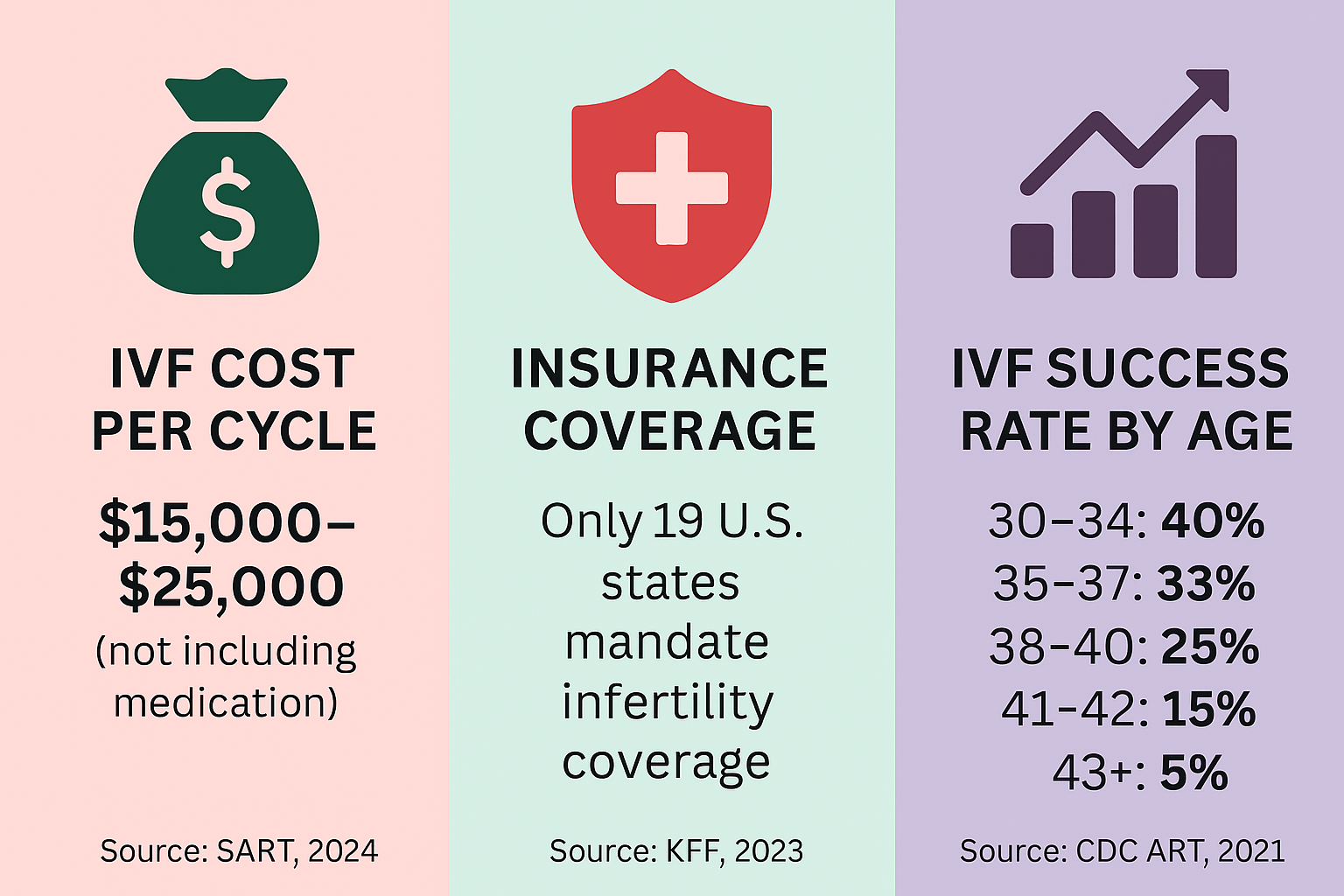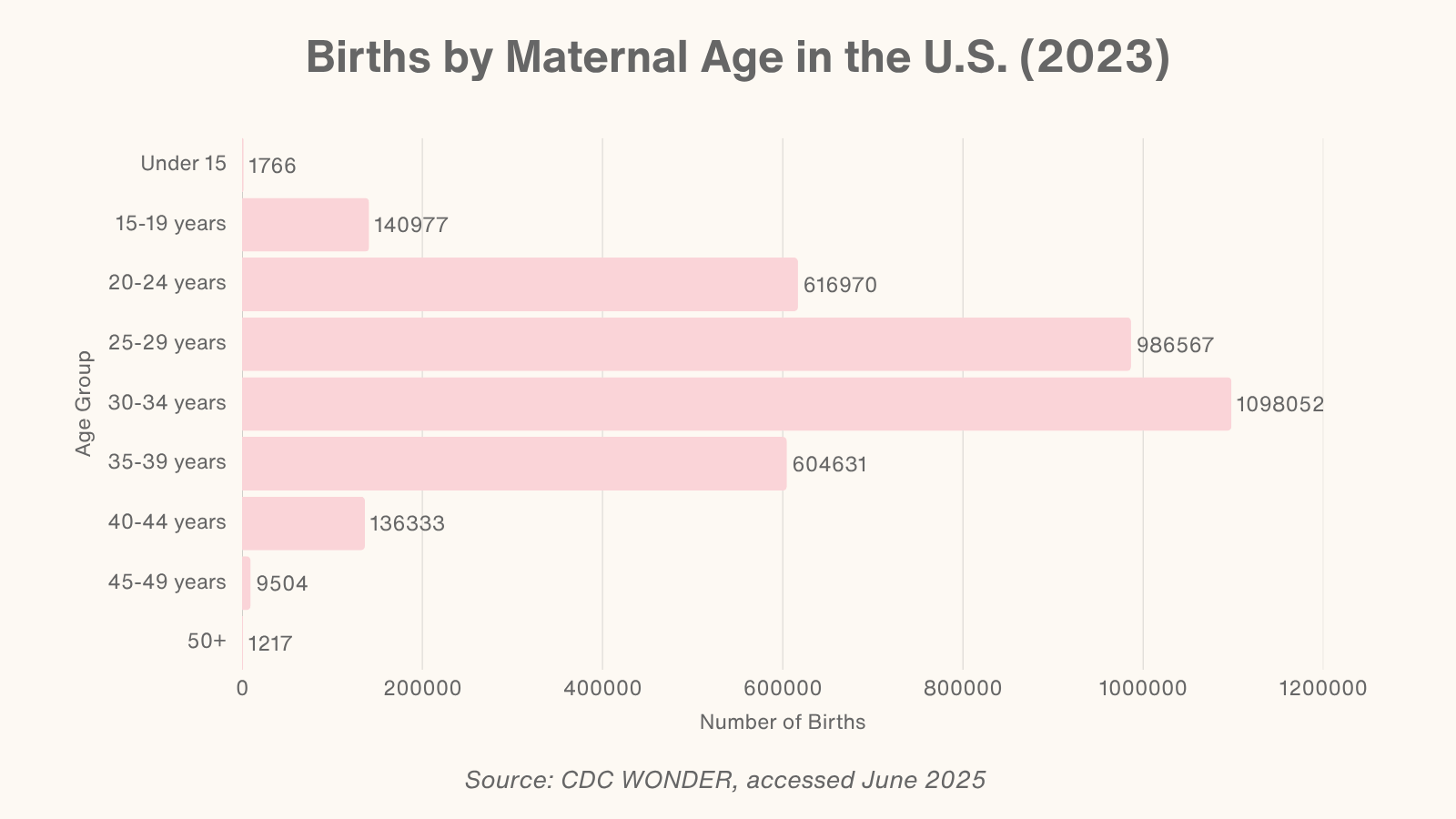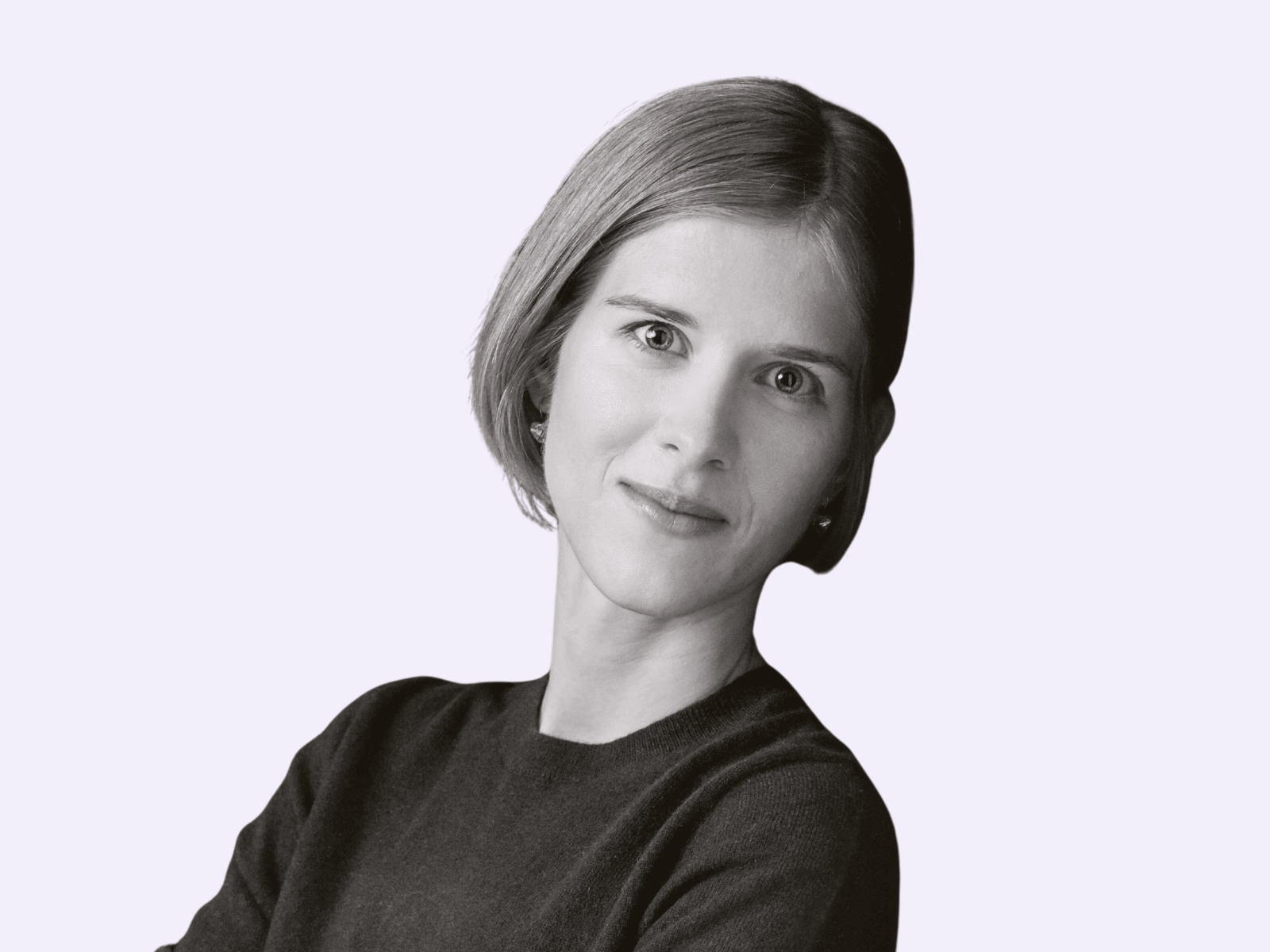
When the Nanny and the Mom Are Both Wondering If It’s Too Late
Listen to This Post
The Quiet Clock Isn’t Equal
When I was 32, I took care of a baby girl whose mother was 41. She had just gone through IVF for the second time. She told me I was lucky, "You still have time."
That comforted me at first. But the more I worked for women in their late 30s and 40s, the more I started to believe that age didn’t matter. If they could do it, why couldn’t I? What I didn’t realize is what they had that I didn’t: time off. Money. Health insurance. A partner. A backup plan. A freezer full of embryos. It wasn’t just biology they were beating. It was a system I couldn’t afford to enter.
"Being a career nanny for 10 years… salts the infertility and miscarriage wounds so hard. Anybody else healing but hurting with me? It sucks knowing your clock is ticking and IVF, etc. is so expensive and unattainable to the average American."
— Reddit user, r/Nanny, May 4, 2023
Infertility Is More Common Than We Think
According to the CDC's NSFG data, 13.8% of U.S. women aged 15-49 experience infertility. Among married women with no prior births, the rate jumps to 19.4%. Fertility challenges don’t care about income, education, or zip code. They affect mothers and nannies alike. But what is different? Who gets help.

Birth Trends: Is 35 Really Late?
We’re often told 35 is the fertility cliff. But according to CDC WONDER, in 2023:
- Over 30% of U.S. births were to women aged 30+
- Births to women aged 35–39 and 40–44 continue to rise steadily
In cities like NYC or San Francisco, being a first-time mom at 38 is almost expected.
That reality shapes how many caregivers think about their own timeline. If she can have a baby at 39, can I wait too? But what many nannies don’t see are the months (or years) of trying, failing, and thousands of dollars spent behind closed doors.
IVF Is Rising, But Still Out of Reach
According to the CDC ART dashboard:
- 86,146 babies were born via assisted reproductive tech (ART) in 2021
- That’s just 2% of U.S. births
- Most IVF success is concentrated in women aged 30–39
IVF works for many. But not all. And not equally.

Fertility Support Isn’t Equal, And That’s Not Fair
Infertility may not discriminate. But treatment access absolutely does.
A professional woman with a stable salary might:
- Freeze her eggs
- Pay for three rounds of IVF
- Get leave for morning monitoring
A nanny might:
- Lose her job if she’s pregnant
- Have no insurance for fertility treatment
- Delay motherhood entirely due to cost
"I’ve worked for my family for years and am super close with them but haven’t disclosed that we are trying because I probably will want to stay home for at least several months if not permanently if I do give birth and I don’t want to end up losing my job prematurely if I never even end up pregnant."
— Reddit user, r/Nanny, June 17, 2024
The Nanny and the Employer: Same Age, Different Paths
According to ZipRecruiter, most professional nannies in the U.S. are between 25–35. In cities like NYC, the average first-time mother is 35–40. So the timelines overlap. But the realities don’t. One is postponing. The other is powering through IVF. Both are wondering: Will it work out?

Many caregivers don’t have children yet, not because they don’t want them, but because the job doesn’t allow for it. No maternity leave. No space to bring your child. No backup if something goes wrong. Some leave childcare to start families. Others stay and silently grieve the delay.
Some Nannies Don’t Want Kids, And That’s Okay
Caregiving gives women a front-row seat to motherhood, the joy and the exhaustion. Some nannies walk away with clarity: This isn’t for me.
And that choice? It deserves the same respect. And for others, the decision not to have children isn't just a personal revelation, it’s a heavy and often painful reckoning. Because caregiving up close doesn’t just show the love. It shows the cost.
- The cost of diapers and formula
- The loss of sleep
- The loss of self
- The years of career pause or instability
Being a nanny is often the most honest preview of what motherhood really requires. And for some of us, that view changes everything.
"I always daydreamed about the perfect family and having 2 kids, had the cliché list of baby names on my phone, Pinterest boards of cute nurseries and everything. My own mom gushed about her motherhood experience and it just seemed so natural to one day become a mother too. I loved kids and nannying felt like the right career choice, and I honestly still feel this way. What I NEVER expected was to have the life-altering realization that kids are actually not a good idea (for me personally), and now I can solidly say I am childfree by choice. Most see the glamorized view of parenthood and (...) fall in love with the concept of carrying 1/2 of your partner, having a mini me, etc. What they don’t consider is everything that could go wrong, how their own unhealed traumas can be re-triggered through parenthood, how it often irrevocably impacts your physical, mental, and financial health, how it alters each and every one of your relationships and not always in a good way (...) how 'breaks' from parenting can still be stress and guilt inducing, and how until your last breath you are a parent and that it is truly a lifelong commitment. All of this I have seen firsthand."
— Reddit user, r/Nanny, June 16, 2024
Has working as a nanny changed how you feel about having kids?
Current Results:
Mothers Are Getting Older, But Fertility Isn’t Getting Easier
Let’s not confuse visibility with ease. More women are having babies after 35. But biology hasn’t changed. Only the resources have.
The women making it work later in life often have:
- Flexible work
- Financial stability
- Partners or paid support
The timeline is shifting. But it’s not shifting equally.

Final Word: Let’s Name It
Whether you’re a nanny or a mom, whether you want kids or don’t, whether you’re trying or grieving or unsure; fertility is emotional terrain. And it’s time we stop pretending the struggle is rare or fair. Fertility is not failure. It’s common. It’s complicated. It’s human.
More Caregiver Experience

Caregiver Experience
Aging Out as a Nanny: What Comes Next?
There’s no right time to leave nannying, only the right time for you, and that choice can lead anywhere.

Caregiver Experience
When Parents Undermine Your Expertise
How to advocate for yourself when your judgment isn’t trusted. Learn how small daily choices shape bigger challenges for kids, families, and caregivers alike.

Caregiver Experience
The Invisible Caregiver: What Nannies Are Really Saying Online
I analyzed over 1,000 Reddit posts from nannies to uncover what they’re really feeling, and it’s not just about pay.
Pregnant or doing IVF while working in childcare? Before you say anything, check out this free Disclosure Guide to think through your timing, options, and boundaries; professionally and personally.

Written by Sylwia Glinska
Founder of Bottles & Bytes • Nanny, Newborn Care Specialist & Childcare Consultant
Get To Know Me